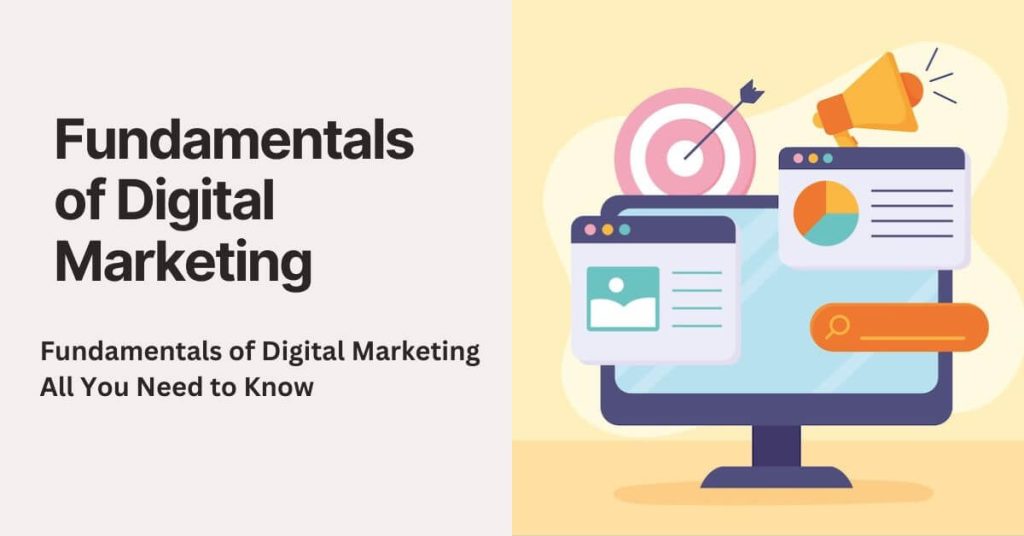Digital marketing is integral to any business’s marketing strategy. It encompasses a range of strategies aimed at reaching and retaining customers through digital channels. Whether you’re a small business owner or a marketing professional, this blog provides valuable insight into what digital marketing is, its importance, and what are the fundamentals of digital marketing.
Why is Digital Marketing Important?
Reach a larger audience, is cost-effective, offers targeted marketing, provides measurable results, and is flexible and adaptable to changing market conditions are counted as the benefits of digital marketing. You can reach the potential audience in a limited budget by using digital channels.
Track your business success and get measurable results by targeting the demographics and interest by using digital marketing strategies. These marketing techniques are easy to adjust based on the latest trends in an ever changing market. You can only leverage the benefits of digital marketing by knowing the fundamentals of digital marketing.
Fundamentals of Digital Marketing
Digital marketing has several types used to promote their products or services of any business. Digital marketing is a colossal which encompasses different ways to reach the target audience. Let’s discuss some of the fundamentals of digital marketing:
Search Engine Optimization (SEO)
Search Engine Optimization (SEO), marketing technique is used to optimize a website or online content. It improves content visibility and ranking in search engine results pages (SERPs). The goal of SEO is to increase the quantity and quality of organic (unpaid) traffic to a website from search engines like Google, Bing, and Yahoo. SEO techniques like keyword research, on-page optimization, link building, and content creation makes a website more attractive to search engines and improves its chances of ranking higher in search results. By improving its SEO, a business attracts more potential customers to its website.
Importance of SEO for businesses
SEO is important for businesses to attract new customers and gain a competitive advantage. Some of the key advantages of SEO are:
- Increases online visibility
- Website Traffic
- Credibility
- Competitiveness
- Cost-effective
Basic SEO Strategies
By implementing basic SEO strategies, businesses can improve their website’s search engine visibility and attract more organic traffic, which can lead to more leads, conversions, and sales.
Here are some basic SEO strategies that businesses can implement:
Keyword research: Identify the keywords and phrases that your target audience is searching for and optimize your website and content around them.
On-page optimization: Optimize your website’s title tags, meta descriptions, header tags, and content for your target keywords to improve your website’s relevance and search engine visibility.
Quality content: Create high-quality and engaging content that meets the needs of your target audience, as this can help attract and retain visitors to your website.
Link building: Build high-quality links from reputable websites to improve your website’s authority and search engine visibility.
User experience: Improve the user experience of your website by ensuring it is fast, easy to navigate, and mobile-friendly, as this can improve your website’s search engine rankings and user engagement.
Pay Per Click Advertising (PPC)
Pay-Per-Click Advertising (PPC) is a digital advertising model in which advertisers pay each time a user clicks on one of their ads. Such ads are usually displayed on search engine result pages or social media platforms. Advertisers bid on specific keywords or target specific audiences to display their ads. The cost per click (CPC) of an ad is determined by the level of competition for the chosen keywords or target audience. Thus, the advertiser sets a budget for their campaign. PPC is an effective way for businesses to drive targeted traffic to their website. It also increases conversions, as they only pay when someone clicks on their ad.
Importance of PPC
PPC advertising is important for businesses as it allows them to target specific audiences based on demographics, interests, and behavior. This results in:
- Targeted Advertisement
- Increased Visibility
- Measurable results
- Cost Effective
Basic PPC Strategies
Some of the basic PPC strategies implemented by businesses that can create effective campaigns that drive relevant traffic, increase conversions, and achieve their advertising goals are:
Keyword research: Conduct thorough keyword research to find the most relevant and cost-effective keywords for your business.
Ad copy: Write compelling ad copy that communicates your message and offers a solution to the user’s problem or need.
Landing pages: Create dedicated landing pages that are optimized for conversions and provide a seamless user experience.
Ad targeting: Use targeting options such as location, demographics, interests, and behavior to reach the right audience.
Ad scheduling: Schedule your ads to run at specific times of the day or days of the week when your target audience is most active.
Bid management: Set bids at an appropriate level to ensure that your ads are displayed prominently without overspending.
Ad testing: Continuously test and optimize your ads to improve performance and achieve better results.
Website Design and Development
Website design and web development include creating and building websites. It involves designing the visual layout and user interface of a website, as well as developing the underlying code and programming necessary to make the website function properly. It covers creating web pages and adding functionality such as forms or e-commerce capabilities. More so, it ensures that the website is optimized for search engines and mobile devices. Website design and development requires knowledge of programming languages such as HTML, CSS, and JavaScript, as well as web development frameworks and content management systems. The goal of website design and development is to create a website that is visually appealing, user-friendly, and meets the needs and goals of the website’s owner.
Importance of Website Design and Development
Website design and development are important for businesses for several reasons:
- User Experience
- First Impression
- Mobile Impression
- SEO
- Credibility and trust
Basic Website Design and Development Strategy
The basic website design and development strategy involves the following steps:
Planning: Define the website’s purpose, target audience, and goals.
Research: Research the target audience, competitors, and industry trends.
Design: Create the website’s visual design, user interface, and user experience.
Development: Build the website using programming languages and content management systems.
Testing: Test the website’s functionality, performance, and compatibility across different devices.
Launch: Publish the website and make it accessible to the public.
Maintenance: Regularly update and maintain the website to ensure it stays functional and relevant.
Content Marketing
Content marketing is a marketing strategy of creating and sharing valuable, relevant, and consistent content to attract and retain a clearly defined audience. The use of content marketing is to establish trust and credibility with the audience. Thus, ultimately drive profitable customer action such as sales or leads. Content marketing takes various forms such as blog posts, videos, social media posts, infographics, and more. The key is to create content that provides value to the audience and addresses their pain points, interests, and needs.
Importance of Content Marketing
Content marketing is important for businesses as:
- It helps establish businesses as thought leaders
- Increase brand awareness
- Improve search engine rankings
- Generate leads, build trust, credibility and support customer retention
Basic Content Marketing Strategies
Here are some basic content marketing strategies:
Define your Target Audience: Before creating content, it’s important to know who you’re creating it for. Define your target audience’s demographics, interests, and pain points to create content that resonates with them.
Develop a Content Plan: Create a plan that outlines the type of content you’ll create, how often you’ll publish it, and how you’ll promote it.
Create High-Quality, Relevant Content: Focus on creating content that is informative, valuable, and relevant to your target audience. Use a variety of formats, such as blog posts, videos, infographics, and social media posts, to keep your content fresh and engaging.
Optimize for Search Engines: Use relevant keywords in your content to improve its visibility on search engines. Make sure your website is optimized for SEO, and include links to your content on social media and other relevant websites.
Promote your Content: Use social media, email marketing, and other channels to promote your content and reach your target audience. Collaborate with influencers and other brands to reach a wider audience.
Measure and Analyze your Results: Use analytics tools to track the performance of your content and adjust your strategy accordingly. Monitor metrics such as website traffic, engagement, and conversions to see what’s working and what’s not.
Email Marketing
Email marketing encompasses sending promotional or informational messages to a targeted group of people via email. These messages include newsletters, promotional offers, event invitations, and other types of content. Businesses leverage email marketing to build and maintain relationships with customers, promote brand awareness, and drive sales or other desired actions. It is an effective and cost-efficient way to reach a large audience, as well as to personalize messages. It tracks engagement through metrics such as open rates, click-through rates, and conversions.
Importance of Email Marketing
Email marketing is a cost-effective way for businesses to:
- Measurable results
- Personalized and segmented for targeted campaigns
- Help build relationships and increase customer loyalty
Basic Email Marketing Strategies
Here are some basic email marketing strategies:
Build a Targeted Email List: Create an email list with subscribers who are interested in your product or service.
Use a Catchy Subject Line: Write a subject line that grabs the reader’s attention and entices them to open the email.
Personalize the Email: Use the recipient’s name and other relevant information to personalize the email.
Provide value: Offer valuable content or exclusive offers to your subscribers to keep them engaged.
Use a Clear Call-to-Action: Communicate what you want the recipient to do, such as making a purchase or visiting your website.
Optimize for Mobile: Make sure your emails are mobile-responsive and easy to read on mobile devices.
Test and Analyze: Test different email formats, subject lines, and call-to-actions to see what works best, and use data analysis to refine your strategy over time.
Analytics and Reporting
Analytics and reporting involve collecting and analyzing data to make informed decisions and measure performance. Insights into customer behavior can help businesses improve their products and marketing strategies. Reporting presents data in an organized format for stakeholders to make informed decisions.
Importance of Analytics and Reporting
Analytics and reporting provide businesses with the benefits of
- Valuable insights into customer behavior
- Help measure the performance of various activities
- Identify trends and monitor ROI
Basic Analytics and Reporting Strategies
Here are some basic analytics and reporting strategies for businesses:
Define your Goals: Clearly define your business goals and the metrics you will use to measure success.
Use Analytics Tools: Implement analytics tools to collect data and track the performance of your website, social media, and marketing campaigns.
Analyze the Data: Use data analysis to identify trends and patterns, and gain insights into customer behavior and preferences.
Create Reports: Create clear and concise reports that highlight key metrics and provide actionable insights.
Share the Data: Share the data and reports with relevant stakeholders, such as marketing teams and executives, to inform decision-making and strategy development.
Continuously Monitor and Adjust: Continuously monitor the performance of your activities, and adjust your strategies as needed to optimize results and achieve your business goals.
Sum and Substance
This blog provides insight on how understanding the fundamentals of digital marketing is important for any business. From knowing the importance of digital marketing, it can be stated that in current times digital marketing is a necessary tool. Digital billboards have taken over traditional boards. The gigantic digital displays at New York Time Square, taxing in digital display tops, mobile digital billboards trucks are a precedent of digital marketing.


















